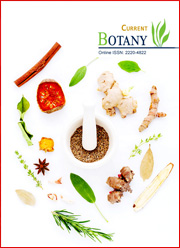In vitro salt tolerance induced secondary metabolites production in Abrus precatorius L.
DOI:
https://doi.org/10.25081/cb.2021.v12.6391Keywords:
Callus, phytohormones, salt tolerance, secondary metabolites, GC-MS analysis, retention time.Abstract
The white seeded Abrus precatorius L. is an important herbaceous medicinal plant with broad range of therapeutic effects. In the present study, the internode was selected as explant for in vitro salt tolerance analysis. For callus induction, MS medium with different concentrations and combinations of BAP, KIN and IBA were used. Better callus Fresh Weight and Dry Weight observed on MS medium supplemented with BAP 0.5mg/l and KIN 1mg/l. To detect the in vitro salt tolerance potential of calli, NaCl at different concentrations (0, 20, 40, 60, 80 and 100mM) were supplemented on MS+BAP0.5mg/l+KIN1mg/l of which 40mM NaCl induced better callus proliferation. The callus grown without NaCl stress showed the presence of eight phytochemical compounds in GC-MS analysis. While the NaCl stress tolerant callus exhibited the presence of seventeen phytochemical compounds. All these analyzed compounds were with antimicrobial / anti-oxidant properties. The present work will be very much helpful to ameliorate the production of medicinally significant compounds in the pharmaceutical industry.
Downloads
Published
How to Cite
Issue
Section
Copyright (c) 2021 P. Deepa, K.P. Lafna Farshana

This work is licensed under a Creative Commons Attribution-NonCommercial 3.0 Unported License.



 .
.